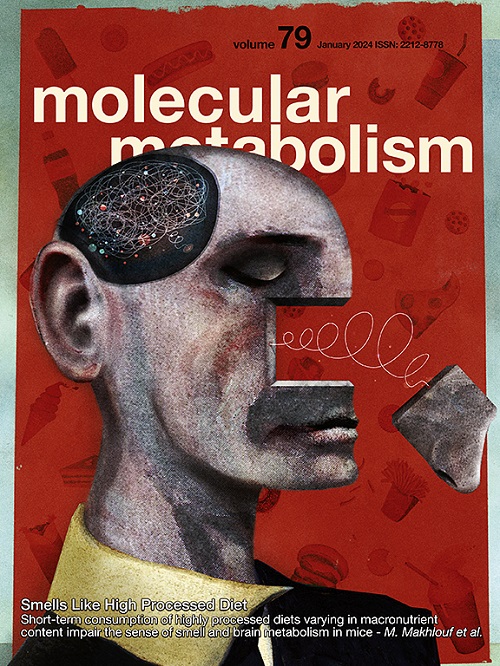Enhanced metabolic adaptations following late dark phase wheel running in high-fat diet-fed mice
IF 6.6
2区 医学
Q1 ENDOCRINOLOGY & METABOLISM
引用次数: 0
Abstract
Exercise interventions represent an effective strategy to prevent and treat metabolic diseases and the time-of-day-dependent effects of exercise on metabolic outcomes are becoming increasingly apparent. We aimed to study the influence of time-restricted wheel running on whole-body energy and glucose homeostasis. Male, 8-week-old, C57BL/6NTac mice were fed either a 60% high-fat diet (HFD) or a 10% low-fat diet (LFD) for 4 weeks. Following this, mice were given access to a running wheel between zeitgeber time (ZT) 12–16 (early dark phase) or ZT 20-0 (late dark phase). Sedentary mice had access to a permanently locked wheel. Mice were housed under these conditions in metabolic chambers for 4 weeks in which LFD and HFD conditions were maintained. Following the exercise intervention, body composition and glucose tolerance were assessed. Wheel running during either the early or late dark phase resulted in metabolic improvements such as attenuation in body weight gain, enhanced glucose tolerance and reduced ectopic lipid deposition. However, late dark phase exercise resulted in a greater reduction in body weight gain, as well as enhanced metabolic flexibility and insulin sensitivity. Our data suggest that late dark phase versus early dark phase exercise confers greater metabolic adaptations in HFD-fed mice.
高脂肪饮食小鼠在晚暗相轮运动后增强的代谢适应。
运动干预是预防和治疗代谢性疾病的有效策略,运动对代谢结果的时间依赖性影响正变得越来越明显。我们的目的是研究限时轮跑对全身能量和葡萄糖稳态的影响。8周龄雄性C57BL/6NTac小鼠分别饲喂60%高脂饮食(HFD)和10%低脂饮食(LFD) 4周。在此之后,小鼠在授时时间(ZT) 12-16(早期暗期)或ZT 20-0(晚暗期)之间进入跑步轮。久坐不动的老鼠可以接触到一个永久锁定的轮子。在这些条件下,小鼠被安置在代谢室中4周,其中维持低脂和高脂状态。运动干预后,评估身体成分和葡萄糖耐量。在黑暗期的早期或晚期,轮毂运动导致代谢改善,如体重增加的衰减,葡萄糖耐量的增强和异位脂质沉积的减少。然而,在暗期运动的后期,体重增加的减少幅度更大,代谢灵活性和胰岛素敏感性也得到了增强。我们的数据表明,在饲喂hfd的小鼠中,较晚的暗期运动与较早的暗期运动赋予了更大的代谢适应性。
本文章由计算机程序翻译,如有差异,请以英文原文为准。
求助全文
约1分钟内获得全文
求助全文
来源期刊

Molecular Metabolism
ENDOCRINOLOGY & METABOLISM-
CiteScore
14.50
自引率
2.50%
发文量
219
审稿时长
43 days
期刊介绍:
Molecular Metabolism is a leading journal dedicated to sharing groundbreaking discoveries in the field of energy homeostasis and the underlying factors of metabolic disorders. These disorders include obesity, diabetes, cardiovascular disease, and cancer. Our journal focuses on publishing research driven by hypotheses and conducted to the highest standards, aiming to provide a mechanistic understanding of energy homeostasis-related behavior, physiology, and dysfunction.
We promote interdisciplinary science, covering a broad range of approaches from molecules to humans throughout the lifespan. Our goal is to contribute to transformative research in metabolism, which has the potential to revolutionize the field. By enabling progress in the prognosis, prevention, and ultimately the cure of metabolic disorders and their long-term complications, our journal seeks to better the future of health and well-being.
 求助内容:
求助内容: 应助结果提醒方式:
应助结果提醒方式:


